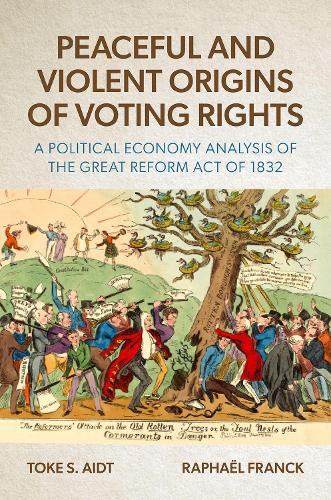Readings Newsletter
Become a Readings Member to make your shopping experience even easier.
Sign in or sign up for free!
You’re not far away from qualifying for FREE standard shipping within Australia
You’ve qualified for FREE standard shipping within Australia
The cart is loading…






The Great Reform Act of 1832 was a pivotal moment in British political development that opened the door of democratic reform, entailing a slow and gradual journey to universal suffrage, secret ballot, and competitive elections. But it could have failed.In Peaceful and Violent Origins of Voting Rights, Toke S. Aidt and Raphael Franck articulate a new process-based perspective on the study of democratization through a detailed analysis of the Great Reform Act of 1832. Instead of using the historical narrative to provide evidence of a particular theory, the authors use microdata generated by the reform to test competing theories. Aidt and Franck apply their approach to the Reform Bill through econometric analyses that draw on rich micro-political data to show why the reform succeeded despite significant opposition at three different stages: in both the House of Commons and the House of Lords, as well as winning popular support in a general election. While fears of revolution were critical in generating popular support for the Reform Bill in the 1831 General Election, they argue that it was mainly extra-parliamentary agitation from reform societies that helped the bill obtain its one-vote majority in the House of Commons. By viewing democratic reform as a process rather than as a single event, the authors provide more nuanced answers to what caused the West to extend the franchise. Further, the book presents new insights into the underlying forces of democratisation processes.
$9.00 standard shipping within Australia
FREE standard shipping within Australia for orders over $100.00
Express & International shipping calculated at checkout
The Great Reform Act of 1832 was a pivotal moment in British political development that opened the door of democratic reform, entailing a slow and gradual journey to universal suffrage, secret ballot, and competitive elections. But it could have failed.In Peaceful and Violent Origins of Voting Rights, Toke S. Aidt and Raphael Franck articulate a new process-based perspective on the study of democratization through a detailed analysis of the Great Reform Act of 1832. Instead of using the historical narrative to provide evidence of a particular theory, the authors use microdata generated by the reform to test competing theories. Aidt and Franck apply their approach to the Reform Bill through econometric analyses that draw on rich micro-political data to show why the reform succeeded despite significant opposition at three different stages: in both the House of Commons and the House of Lords, as well as winning popular support in a general election. While fears of revolution were critical in generating popular support for the Reform Bill in the 1831 General Election, they argue that it was mainly extra-parliamentary agitation from reform societies that helped the bill obtain its one-vote majority in the House of Commons. By viewing democratic reform as a process rather than as a single event, the authors provide more nuanced answers to what caused the West to extend the franchise. Further, the book presents new insights into the underlying forces of democratisation processes.